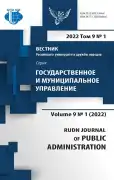The Role of Public Participation in Governance towards Achieving Sustainable Development. Part 2
- Authors: Nyaranga M.S.1, Hao C.1, Hongo D.O.1
-
Affiliations:
- Jiangsu University
- Issue: Vol 9, No 1 (2022)
- Pages: 29-41
- Section: Public administration: theory and practice
- URL: https://journal-vniispk.ru/2312-8313/article/view/318037
- DOI: https://doi.org/10.22363/2312-8313-2022-9-1-29-41
- ID: 318037
Cite item
Full Text
Abstract
Public participation aimed at improving the effectiveness of governance by involving citizens in governance policy formulation and decision-making processes. It was designed to promote transparency, accountability and effectiveness of any modern government. Although Kenya has legally adopted public participation in day-to-day government activities, challenges still cripple its effectiveness as documented by several scholars. Instead of reducing conflicts between the government and the public, it has heightened witnessing so many petitions of government missing on priorities in terms of development and government policies. Results show that participation weakly relates with governance hence frictions sustainable development. Theoretically, public participation influences governance efficiency and development, directly and indirectly, thus sustainable development policy and implementation depends on Public participation and good governance. However, an effective public participation in governance is has been fractioned by the government. Instead of being a promoter/sponsor of public participation, the government of Kenya has failed to put structures that would spur participation of citizens in policy making and other days to activities. This has brought about wrong priority setting and misappropriation of public resources; The government officials and political class interference ultimately limit public opinion and input effects on decision-making and policy formulation, which might be an inner factor determining the failure of public participation in Kenya. The study suggests the need for strengthening public participation by establishing an independent institution to preside over public participation processes.
About the authors
Maurice S. Nyaranga
Jiangsu University
Author for correspondence.
Email: simiyunyaranga@gmail.com
ORCID iD: 0000-0003-1127-0789
Student of the Department of State and Municipal Management
Zhenjiang, Jiangsu, P.R. China, 212013Chen Hao
Jiangsu University
Email: zjchenghao@ujs.edu.cn
ORCID iD: 0000-0002-2581-2940
PhD, Professor, School of Management
Zhenjiang, Jiangsu, P.R. China, 212013Duncan O. Hongo
Jiangsu University
Email: dancanome@yahoo.com
ORCID iD: 0000-0003-1069-7238
Master (Statistics), School of Management
Zhenjiang, Jiangsu, P.R. China, 212013References
- Bagozzi R., Yi Y. On Evaluation of of Structural Equation Models. Journal of the Academy and Marketing Science. 1988;16(1):74-94.
- Byrne B.M. Structural Equation Modeling with AMOS: Basic Concepts, Applications,and Programming (second ed.). NY: Taylor & Francis; 2009.
- Huang W., Mary F. Citizen Participation in Local Government Decision Making: The Role of Manager Motivation. Review of Public Personnel Administration. 2015;36(2):188-209.
- Drazkiewicz A., Challies E., Newig J. Public Participation and Local Environmental Planning: Testing Factors Influencing Decision Quality and Implementation in Four Case Studies from Germany. Land Use Policy. 2015;46:211-222.
- Fung A. Putting the Public back into Governance: The Challenges of Citizen Participation and Its Future. Public Administration Review. 2015;75(4):513-522.
- McNulty S.L., Wampler B. Participatory Governance. Emerging Trends in the Social and Behavioral Sciences: An Interdisciplinary. Searchable, and Linkable Resource. 2015;1:1-14.
- Njagi T., Kinyumu N,. Kirimi L. Farm Household’s Participation in Governance: Lessons from Devolved Systems in Kenya. IDEAS. URL: https://ideas.repec.org/p/ags/iaae18/276006.html. Accessed: 22.09.2021.
- Yami M., Van A.P., Hauser M., Schut M., Pali P. Participation without Negotiating: Influence of Stakeholder Power Imbalances and Engagement Models on Agricultural Policy Development in Uganda. Rural Sociology. 2018;84(2);340-415.
- Gaventa J., Barrett G. Mapping the Outcomes of Citizen Engagement. World development. 2012;40(12):2399-2410.
- Mohanty R. The Infinite Agenda of Social Justice. Dalit Mobilization in Indian Institutions of Local Governance. Mobilizing for Democracy: Citizen Action and the Politics of Public participation (V. Coehlo, & B.von Lieres (Eds.). NY: Zed; 2010.
- Molokwane T., Lukamba T. Citizen Involvement in the Formulation of Public Policy. International Conference on Public Administration and Development Alternatives (IPADA). South Africa; Stellenbosch University, 2018.
- Ronoh G., Mulongo S.L., Kurgat A. Challenges of Integrating Public Participation in the Devolved System of Governance for Sustainable Development in Kenya. Eldoret: Moi University; 2018.
- Rossouw M. Public Participation: An Imperative for Governance and Human Rights - Lessons From South Africa. 2019. URL: http://futureafricaforum.org/2019/03/04/public-participation-an-imperative-for-governanceand-human-rights-lessons-from-south-africa/. Accessed: 22.09.2021.
- Okello N., Beevers L., Douven W., Leentvaar J. The Doing and Undoing of Public Participation during Environmental Impact Assessments in Kenya. Impact Assessment and Project Appraisal. 2009;9(3):216-226.
- Nyaranga M.S., Hao C., Hongo D.O. Strategies of Integrating Public Participation in Governance for Sustainable Development in Kenya. Public Policy and Administration Research. 2019; 9(7):56-63.
Supplementary files










